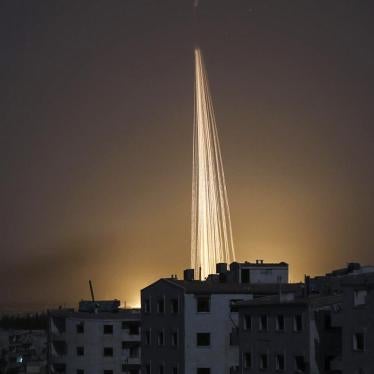Nearly 70 countries made major progress toward a ban on cluster munitions that cause deadly harm to civilians, Human Rights Watch said today at the end of three days of treaty discussions in Lima.
Sixty-eight states gathered in Peru for the second meeting of the so-called Oslo Process to ban the use, production, stockpiling and transfer of the weapons. In February, 46 countries launched a treaty-negotiating process in Oslo, agreeing to the Oslo Declaration’s pledge to reach an international agreement to ban cluster munitions that cause unacceptable harm to civilians by the end of 2008.
“We are confident we can agree to a treaty banning cluster munitions within a year,” said Steve Goose, director of the Arms division at Human Rights Watch. “Twenty-eight new countries joined the process in Lima, showing that the support for a ban on clusters is rapidly gaining momentum. If we don’t act, cluster munitions are almost certain to cause a humanitarian disaster, so any government wishing to avert that will come on board immediately.”
States at the conference, hosted by Peru, reached a broad agreement on the framework of a future treaty and its main elements. In addition to the prohibition on new cluster munitions, the treaty will include requirements and deadlines for stockpile destruction and clearance of contaminated areas, as well as an obligation to provide victim assistance.
States had substantive discussions about all of these elements. In particular, Human Rights Watch praised states’ efforts to improve on and strengthen provisions based on the Mine Ban Treaty, especially those involving victim assistance and clearance.
Human Rights Watch said it was disturbing that some states proposed exempting large categories of submunitions from the ban, such as those that have self-destruct mechanisms or a specific reliability rate. The extensive failure rate of Israel’s M85 submunitions with self-destruct devices, during the fighting in Lebanon in 2006, highlights the danger of depending on a technical fix. States in favor of such exemptions included Australia, Denmark, Finland, France, Germany, Japan, Poland, and the United Kingdom.
“Technical fixes merely deceive users into thinking that cluster munitions are safe for civilians,” Goose said. “The burden of proof is on governments to demonstrate conclusively that any cluster munition does not cause unacceptable harm to civilians.”
Many of the same states insisted that discussions on cluster munitions in the Convention on Conventional Weapons (CCW) should take precedence over the Oslo Process. But despite years of discussion on cluster munitions at CCW, states parties have yet to agree on a negotiating mandate for a protocol on the weapon. Returning to CCW would likely significantly slow down and weaken the creation of a cluster munition treaty.
“The Convention on Conventional Weapons is a distraction that should be avoided,” Goose said. “States must focus on the Oslo Process as the only route for eliminating cluster munitions that cause inexcusable civilian harm.”
The Cluster Munition Coalitionhref>, which Human Rights Watch helped found in 2003 and now co-chairs, and other nongovernmental organizations called on governments to commit to the Oslo Process and support a broad ban on cluster munitions.
Hungary announced a moratorium on cluster munitions, joining a growing list of countries generating national initiatives to restrict the use of cluster munitions. Peru has proposed to make Latin America a cluster munition-free zone, and Costa Rica will sponsor a regional meeting on clusters in August.
African countries came to Lima in force, and many for the first time expressed support for a ban on cluster munitions. The list of African countries new to the process includes Burundi, Ghana, Guinea-Bissau, Lesotho, Liberia, Mauritania, Senegal, Tanzania, Uganda and Zambia. New delegations in Lima also included Laos, the country most affected by unexploded submunitions, which yesterday publicly endorsed the Oslo Declaration’s promise to negotiate a treaty banning cluster munitions that cause humanitarian harm.
The next full meeting in the Oslo Process will be in Vienna from December 5 to 7.
Cluster munitions endanger civilians because each bomb, rocket, or artillery shell spreads dozens or hundreds of submunitions over a broad area, virtually guaranteeing civilian casualties when fired into populated areas. The weapon also leaves a large number of unexploded submunitions, or “duds,” that effectively become landmines, killing or maiming people who come into contact with them long after a conflict ends.
Israel’s use of cluster munitions in southern Lebanon in 2006 demonstrated the potential humanitarian disaster that accompanies cluster munition use. With billions of submunitions stockpiled by more than 75 countries – and documented uses in at least 26 states or disputed territories – unrestricted use of the weapon could kill thousands of civilians during strikes and produce tens of millions of duds.
Globally, 34 countries are known to have produced more than 210 different types of air-dropped and surface-launched cluster munitions. At least 13 countries have transferred more than 50 types of cluster munitions to at least 60 countries. The United States is the world’s largest stockpiler of cluster munitions and deployed the weapons in Iraq and Afghanistan most recently.





